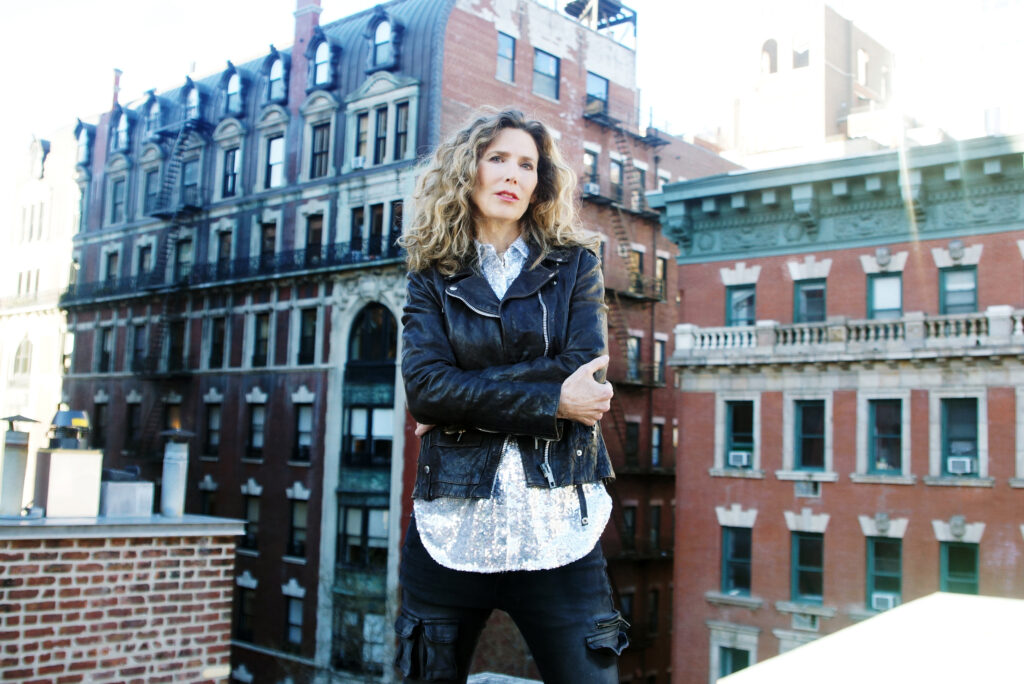Sophie B. Hawkins is back with triumphant new album, Free Myself
It’s been more than a decade since Grammy-nominated singer-songwriter Sophie B. Hawkins released an album and now the long wait is over with the release of Free Myself.
Sophie B. Hawkins has had a singular journey in the world of pop music. Growing up in New York City, she started playing music in her teens at a time when Manhattan had an especially vibrant arts scene. Her first professional gig was as a percussionist for the legendary Bryan Ferry. But Hawkins was also writing her own music and eventually mastered both guitar and piano. In the early ‘90s, she signed with Columbia Records and her 1992 debut, Tongues and Tails, was an immediate success, spawning the smash “Damn, I Wish I Was Your Lover.” Two years later, Hawkins returned with her sophomore set, Whaler, which produced the hits “Right Beside You” and the enchanting “As I Lay Me Down.”
Unfortunately, the third time wasn’t the charm for Hawkins. When Columbia/Sony wanted her to re-record parts of her third album, Timbre, she refused. When Timbre finally appeared, in 1999, it had been five years since Whaler and Columbia/Sony did little to promote her new music. Not surprisingly, Hawkins parted ways with the label shortly after that.
Since that time, Hawkins — who defines herself as “omnisexual” — has stayed busy both personally and professionally. Among other things, she’s starred in a musical about Janis Joplin, placed songs in various hit TV shows and released two more studio discs. But her last album, The Crossing, came out a decade ago now. Since then, Hawkins went through what she’s called “my personal tsunami.” She ended a long-term relationship, gave birth to her daughter Esther and returned to New York after spending 17 years in California. Now, Hawkins is ready to make another return: to music.
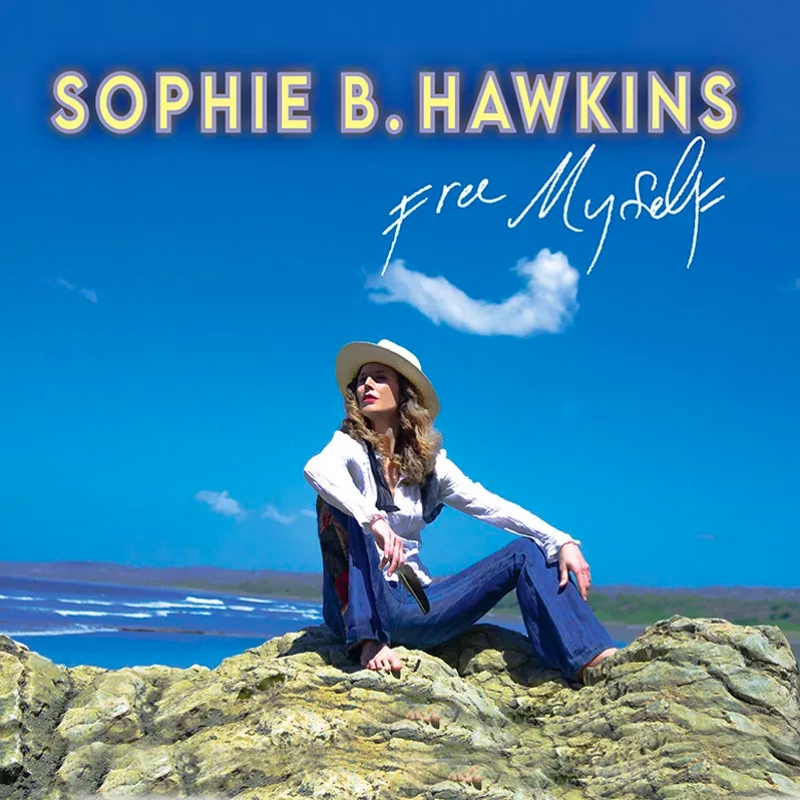
Her sixth studio effort, Free Myself, arrived on March 24th and finds her in fine form. Co-produced with bassist Ken Rich, Free Myself features 10 songs that, taken together, form a song cycle of sorts. There are songs of self-empowerment, like “Love Yourself,” “Better Off Without You” and the title track. There is the lovely, sparse ballad “Green Eyes,” cowritten with British musician Will Knox. But to these ears, Hawkins saves the best for last. “You Are My Balloon,” the final track on Free Myself, is a beautiful song that was inspired by Esther and that wouldn’t be out of place in a Broadway show. It also makes a nice musical counterpart to “As I Lay Me Down” after all these years.
Onstage, Hawkins is a dynamo, as I recently learned when I saw her perform at New York’s City Winery with drummer Katie Marie Richards and multi-instrumentalist Seth Glier. But offstage, Hawkins is pensive, open and unconventional. She’s a true artist and a pleasure to talk with.
There’s a lot to cover. One thing I’m asking every artist is how the pandemic affected you — because it affected all of us.
Sophie B. Hawkins: Six years ago, I was in a place where — it’s like I almost had my wings but didn’t quite. I had left LA for good. Left that life that I’d been building up for 17 years. And I had just had my daughter. I felt like I really wanted to get out there with new music and begin my career again. But I found it really difficult in terms of the world. I felt ready but I couldn’t get the support that I wanted. So that was a challenging time emotionally.
However, I don’t ever say to myself, “This is a challenging time”; I just keep going. I started to write a musical because I thought, “I’m not gonna be able to get my music out there in the same way [I once did]. It won’t be so easy for me to put out albums. Let me figure out a new way.” So I started to write a play, that came to me really intuitively and naturally — scene by scene and song by song. So I continued to work on that as I continued to write others songs that weren’t related to the play — just as the singer-songwriter I’ve always been. And that’s what I’ve really been doing is really developing both sides. And of course painting.
I had just begun touring [again], just begun selling out rooms and then the pandemic hit. I had my kids at home [and] was home schooling them. It was very, very quiet. I wouldn’t say it was sad and stressful for me compared to the rest of the world — because none of us were sick and I was safe. But I did feel the pressure of keeping abreast — and that I really resented. I didn’t want to stay in touch with the world when the pandemic hit. I wanted to just close down and enjoy the time, separate from humanity. Because I felt like humanity [was] spiraling out of control. I loved that the skies were so blue and there were no planes flying. [But] we were forced as parents to keep our kids online. And I think that was the most obnoxious and degrading thing to do to children. They could have really used the time to get out into nature — to be human. And be a part of their family or friends system and be simple again. And connected again. Then we were forced to connect in this artificial way.
So my feelings [about] the pandemic — I didn’t watch TV, I didn’t binge [and] do all that jazz. I didn’t want to. I wanted to be quiet and read and write… And I still think that if less people were connected during the pandemic, we might have gotten through it better. I almost feel [that] we missed a chance. Some things didn’t get healed, and some people are suffering even more now.
Interesting. I don’t have kids, but I agree with you that the pandemic was a missed opportunity… Certainly for America, it was a chance for us to do a lot of things that we didn’t do. What you said also reminded me of something Chrissie Hynde told me early in the pandemic, about how she was sort of savoring the time away from everything.
Sophie B. Hawkins: Yes. It shows you that we need to do that. And there’s a thing now that every time you read something that may be philosophically sound — like the pandemic could have been a missed opportunity — we always have to stick in an apology. It’s almost like we have to now apologize for every single person who may be feeling pain. But the truth is, we’re all in a tremendous rush to annihilate ourselves as a human race. We’ve become too apologetic and too careful about political correctness. That’s what I wanted to say.
Can I ask you about some of the songs on the new album?
Sophie B. Hawkins: (Laughs) Yes! God, we’ve been talking about the world.
No, I could talk about the world [all day]. Hey, Trump is supposed to be indicted today! We could go down that road —
Sophie: He’s going to be! I said to my daughter — she’s seven, as you know. This is like a great moment for her. “Is he really going to be indicted?”
At seven she knows about this?!
Sophie: Yes! I mean, I remember when she was three she said, “Trump has separated mothers from their children. He’s a terrible man.”
Wow! I think when I last talked to you was probably the end of Obama’s presidency. Now it almost feels like Obama didn’t happen. It feels like a million years ago.
Sophie: Yes!
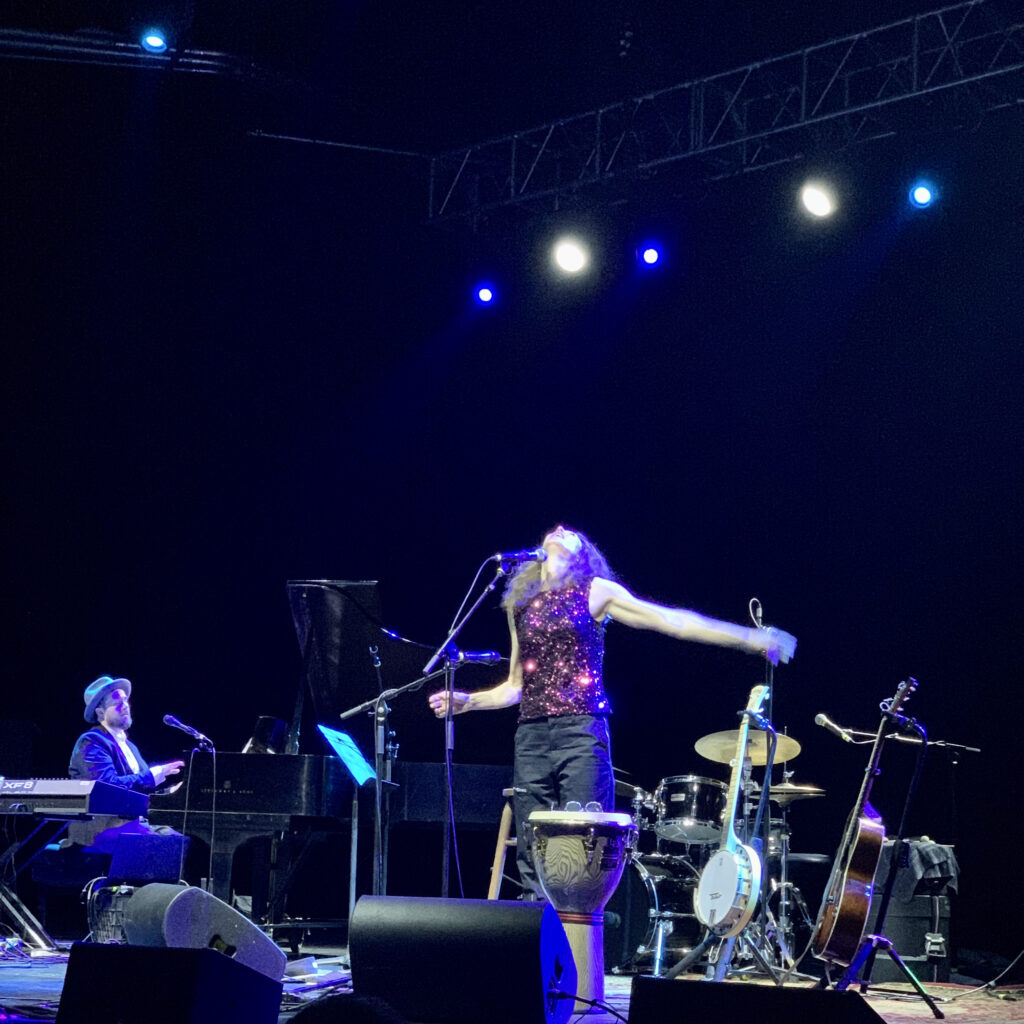
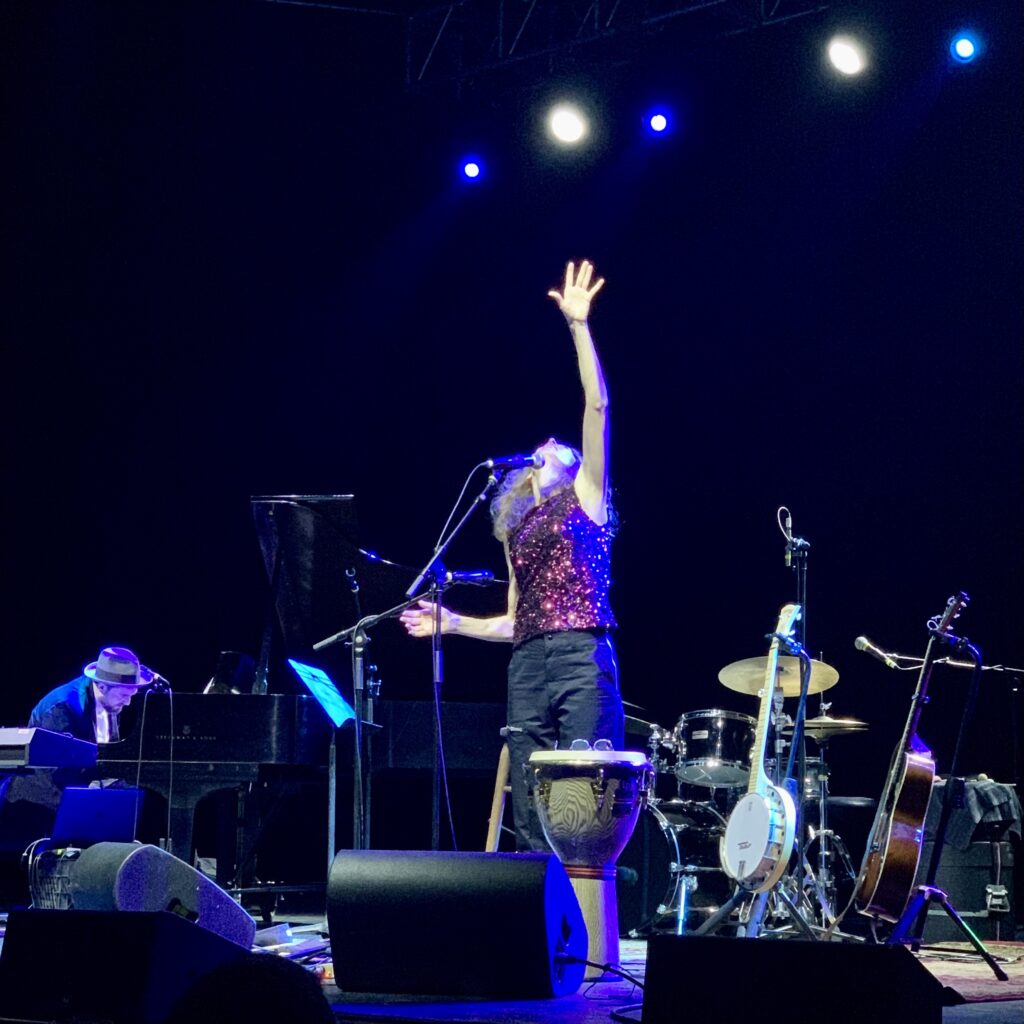
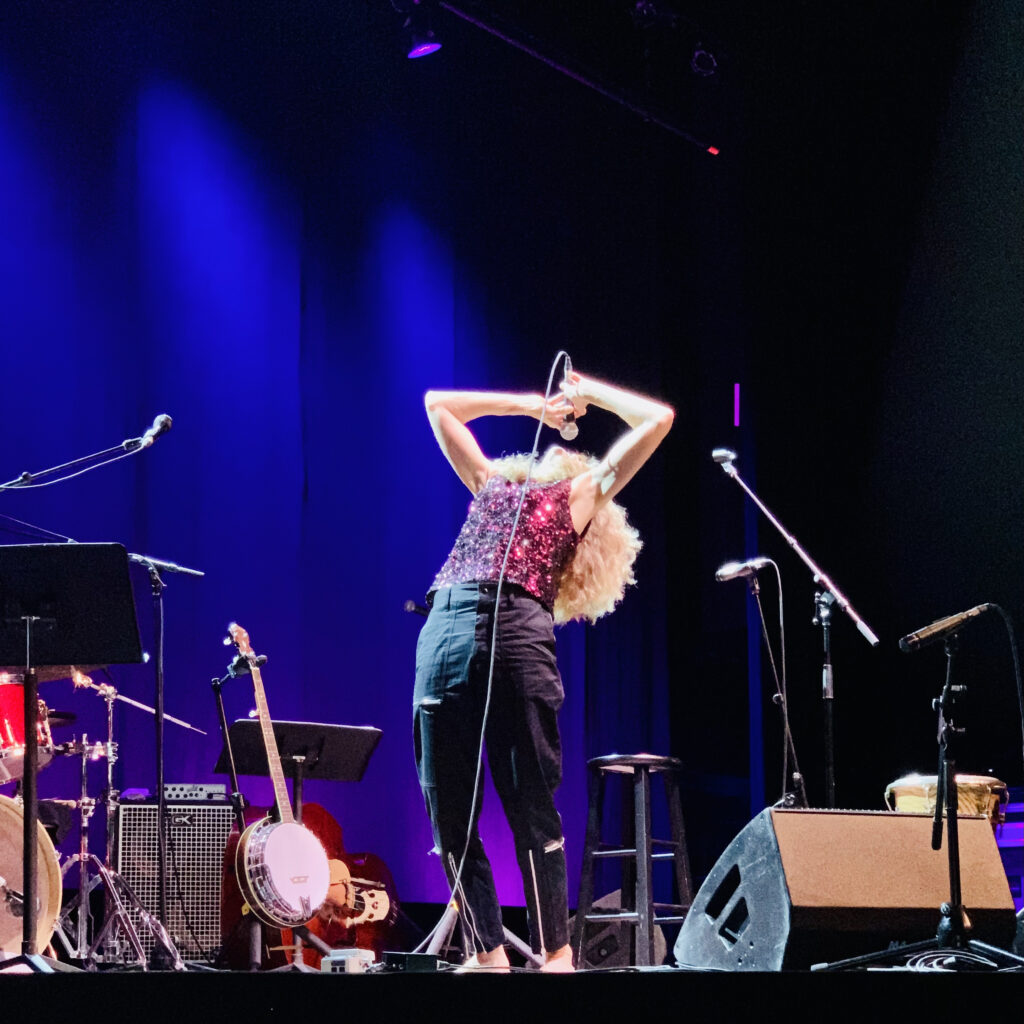
The last song on the album “You Are My Balloon” is a lovely way to end the album Free Myself. I was wondering if you could tell me a little about that song.
Sophie: Well, “You Are My Balloon” is I think one of the best songs I’ve ever written. And I think that because, when I perform it, people just hold their breath. I can feel them looking at me. I’m looking at my balloon — holding it on a string when I’m singing and imagining the story. But it’s so profound that all of us have these connections that are so light. You hold them as long as you can. And then, when you let go, you’re letting go of a part of yourself that’s going into the universe. There’s a sense of relief and sadness.
“You Are My Balloon” was definitely brought out by my children. But it [also] relates to people without children. I mean, sometimes when I’m onstage I sing it to my mother. My mother hurt me as a child. [She] passed away a year ago yesterday. It’s just really universal. The same way “As I Lay Me Down” hits people as so pure, so does “You Are My Balloon.” And what I love about it is that that pureness came from within me.
The current single is “Better Off Without You,” which is a very different kind of tune. Maybe you can tell me about the situation that inspired you write it.
Sophie: Every song of mine, Dave, comes from something that really happened. “Better Off Without You” — it wasn’t immediate when the relationship ended. But at a certain point, it was really clear to me. And the thing is, I couldn’t have said it in words and that’s why I wrote the song.
Sometimes I’m not happy I’m a songwriter because writing songs is really difficult — as all writing is really difficult. But then there are those moments like when that song came out and I just feel like, “Wow! This feels triumphant!” And it actually symbolizes the whole album… There was a sense that, if I could be connected to the highest people or be in the best relationships or whatever, that I would somehow be exalted. But the thing is, all people are really the best when they’re themselves — and often when they’re alone. We don’t have to be lonely. But when we’re alone and just standing on our own, we are so clear and so powerful. And often, people really mess us up! It’s realizing that right now, if wanna stay happy, I better stay free — and not be getting hooked up in some situation where I think someone is smarter than me or better than me. You know, people come along and they convince you that you need them for one reason or another. This is my experience. And then you realize you were actually better off before.
Anyway, that’s where the song came from. It’s the same theme as “Free Myself”—free myself by not being attached to ideas that weigh you down and have nothing to do with your own soul’s journey.
You’re a native New Yorker but you also spent a lot of years in California. After living on the West coast, which is so different, what was it like to come back?
Sophie: First of all, all I wanted to ever do was leave California and come back to New York. But I was in this relationship. I had this life that was kind of beautiful and creative… So it seemed like, “I guess I will stay here for the sake of my partner.” And I certainly learned a lot there and appreciated the terrain of California. For sure. But I did always feel that I was missing out on being in New York.
The minute I got back to New York, I didn’t feel like I was missing out anymore. So that was definitely true; I was missing out! (laughs) And I don’t have to be in New York proper; I can be anywhere in the Northeast and feel that I’m home. My ancestors [were from] all over the Northeast. And when I got back, I just clicked in. I didn’t have this sense of time lost.
So I love being back in the Northeast. There’s an effervescence coming up from the streets of New York that I love. [But] has it changed? Of course it’s changed. But it’s always going through cycles. Even when I was growing up, I would have said the ‘80s were terrible compared to the ‘70s. And the ’90s were better than the ‘80s. Right now, it’s a little [too] money-oriented and a little disconnected. But it’ll be better. Spring is coming.
As someone who is an artist and over 40, what has come to you with age — either as an artist or a person — that you didn’t have in your 20s?
Sophie: This is the great thing about getting older for me. Everything I had in my 20s, I still have. I just have more perspective and more strength. I feel wealthier of creativity, wealthier of space and wealthier of heart and soul in a way. I think the thing [about] getting older is that young people look at you like you’re irrelevant. But the truth is, you’re more relevant than ever because you know so much. If people don’t wanna listen, okay. But being older is a chance to assess every day, ‘cause you know what things are worth now.
“Damn, I Wish I Was Your Lover” didn’t come out of me just because I was young. It was just that [it] came out then and started my life. But I don’t think life is linear. So “Damn, I Wish Your Lover” is still mine. It’s still my feelings, my experience. I haven’t aged out of my important work; I’ve just got more.
So [for] the readers over 40 — I would say, I can endure so much more. I can endure [being] uncomfortable. I can endure insecurity and not knowing what’s going to happen. And also I can appreciate a good night’s sleep! A good meal, a great talk. Everything is so much more meaningful. Every night [when] I’m reading to my daughter, I go, “I wouldn’t trade this for the world.”
One other question. I know you’ve probably answered it a million times, and I asked you this when we spoke last time, but I’m gonna ask you again. “As I Lay Me Down.” I know the story, but I wanna hear it again!
Sophie: Oh my God! Well, I hope it’s the same story. I hope I’m consistent.
I remember the night that I wrote it. I was sitting on the floor, leaning against a bedpost. I had come back from my job waitressing at Souen, a macrobiotic restaurant [in Manhattan]. And again — all my songs are from real stories. So when I wrote, “It felt like springtime on this February morning” — it was! It was the night of that February morning. “In the courtyard, birds were singing your praise.” I had an actual conversation in my mind. And when the chorus started to come out, it was like I was destined to hear this but I’d never heard it before.
Then, when I got to the second verse… “You call my name and it sounds like church bells/Or the whistle of a train on a summer evening.” That’s my father… Because we went to Sag Harbor, N.Y. for summers. He would take the train out there on Thursday, with a lot of [other] lawyers. [I remember] running, and we would flatten our pennies on the rail. And we’d run to meet him over the hard gravel, in our bare feet. Those memories are so incredible as children… And where I [live] now, I hear the train. I hear that train and I go “Oh my God. That’s what it is to be alive.”
Free Myself is out now. For Sophie B. Hawkins tour dates go here. Follow Sophie B. Hawkins on Instagram here.

